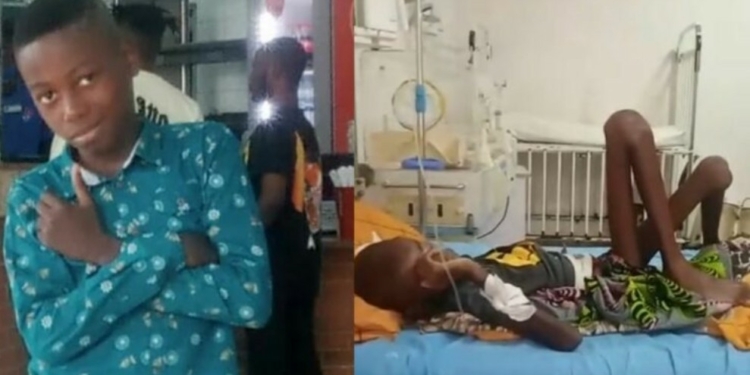- The doctor at Obitoks Hospital affirmed that he wouldn’t have referred them to a government hospital under such circumstances and provided details in the referral letter
- They are also confronted with the possibility of an expensive intestinal transplant, a procedure not available in Africa
A mother, Abiodun Deborah, has appealed to Governor Babajide Sanwoolu of Lagos State to launch a thorough investigation into the disappearance of her 12-year-old son, Adebola Akin-Bright’s small intestine during his treatment at the Lagos State University Teaching Hospital (LASUTH) in Ikeja, Lagos.
She recounted that their ordeal began when surgeons at LASUTH informed her of the disappearance of her son’s intestine after a corrective surgery on July 14, 2023.
Adebola initially received medical treatment at Obitoks Medical Centre, a private hospital located in Ile Epo, Alimosho Local Government Area of Lagos State, when complications arose from surgery aimed at addressing intestinal obstruction.
Deborah recounted the traumatic journey in a viral video said, “Sometime in March this year, my boy started vomiting and stooling, and the hospital we took him to suspected typhoid and he was treated. However, when his condition didn’t improve after about five days, we moved him to another hospital, Obitoks Medical Centre, where it was discovered that he had a ruptured appendix requiring surgery. After about two weeks in the hospital, he emerged looking healthy again and even resumed school, doing well.
“Tragically, in June, Adebola complained of stomach pain, leading us back to the hospital (Obitoks). It was then discovered that he had developed intestinal obstruction, necessitating another surgery.
“There appeared a complication as the boy was still draining bilious fluid more than seven days after the surgery.
“Dr. Abayomi Baiyewu, the CMD at Obitoks, recommended another surgery and even secured the services of a professor from a Teaching Hospital.”
However, Deborah and her family opted for LASUTH, seeking what they believed would be more comprehensive care.
Upon arrival at LASUTH, a series of tests were conducted, and the doctors indicated that Adebola might not require another surgery. Instead, they recommended a conservative treatment and prescribed various medications. However, 25 days later, the Doctors decided that surgery was the best course of action.
However, the consultant surgeon, who performed the surgery, informed Adebola’s mother that his small intestine was missing, and they could not guarantee his survival beyond five days.
Deborah explained that the boy could no longer absorb nutrients from food and might need to rely on total parenteral nutrition (TPN) administered intravenously for the rest of his life.
She lamented: “I was dumbfounded; it was like my whole life was shattered because it was a story that could be told in Nollywood. Where could a 26-feet long small intestine have gone to?”
Deborah contacted the surgeon at Obitoks Hospital, who had conducted previous surgeries on her son, and he expressed surprise at LASUTH’s claim of not finding the boy’s intestine. The doctor at Obitoks Hospital confirmed that he wouldn’t have referred them to a government hospital in such a situation and detailed his actions in the referral letter.
Due to the ongoing expenses of buying TPN (nutrition support), which costs around N65,000 every two days, the family is struggling financially. They also face the possibility of an extremely costly intestinal transplant, a procedure not performed in Africa.
Deborah appealed to Governor Sanwo-Olu to intervene, save her son, and investigate the circumstances surrounding her child’s missing intestine.










Discussion about this post